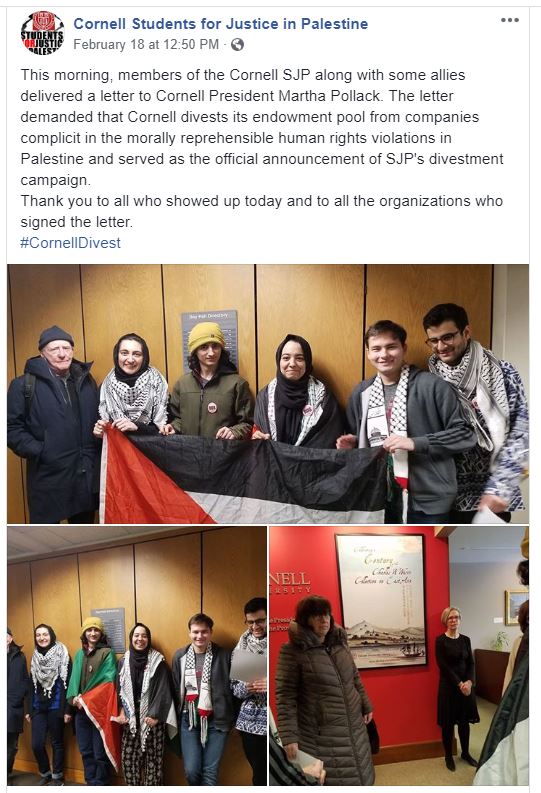Cornell President to Students for Justice in Palestine: “I must reject your call for BDS-related divestment”

At Cornell University, a coalition of student groups led by Students for Justice in Palestine (SJP) has launched a BDS campaign through a Facebook announcement and a letter delivered to Cornell University President Martha Pollack.

We documented the ugly history of anti-Israel activism on the Cornell campus as well as the current effort, Anti-Israel BDS boycott campaign returns to Cornell.
The letter SJP sent to President Pollack was not a serious discussion of the history and politics of the Middle East, but a polemical rant demonizing Israel and Zionism:
A letter to the Cornell Sun announcing the BDS effort to the wider community was equally historically mendacious and inflammatory:
Not a day passes without Israel escalating its assault on the Palestinian people. The 2018 Nation State Law has drawn mass outrage from Palestinians and ethno-religious minorities such as the Druze and Coptic Christians and Israeli Jews. Despite the law’s virtual confirmation of Israel as a racialized apartheid state, the United States has been steadfast in their support for the occupying regime….Any Cornell student opposed to imperialism and international oppression cannot ignore Cornell’s active role in perpetuating this colonial tradition. From the start, Cornell’s campus was built on land stolen from the Cayuga people, and to this day the university continues to work closely with companies and institutions that facilitate the dispossession of the Palestinian people.If we claim to be an institution that is a “bastion of intellectualism” founded on progressive and egalitarian values, we must critically evaluate our actions as a university and individuals. How are we, as conscious members of this University, holding our administration accountable for their ties to an oppressive, occupying state? In the context of the Palestine question, we are nowhere near upholding our founding values. We have an obligation to answer Palestinian civil societies’ call for Boycott, Divestment and Sanctions against the state of Israel….
Popular Front for the Liberation of Palestine Poster
In addition to the non-serious but accusatory announcements of the BDS campaign letters to President Pollack and the Cornell Sun, there were other indications that this time would be a repeat of the aggressive tactics of 2014.
SJP promoted the launch of the BDS campaign with an event poster featuring the Popular Front for the Liberation of Palestine (PFLP).
The PFLP is a Marxist group formed in the late 1960s by George Habash that is on the State Department’s list of Foreign Terrorist Organizations. While the PFLP has been overtaken in power by Islamist groups like Hamas, the PFLP still engages in terrorism, including several suicide bombings during the Second Intifada, an attack in 2014 on a Jerusalem synagogue, and more recent rocket attacks.
Rasmea Odeh, who killed students Edward Joffe and Leon Kanner in the 1969 bombing of the SuperSol supermarket in Jerusalem and recently was deported from the U.S., was a member of the PFLP. Some of the most notorious terror attacks were carried out by the PFLP:
The group won notoriety through a string of plane hijackings, as well as bombings and assassinations. In September 1970, PFLP militants went on a spree of hijackings, eventually landing three captured airliners with 310 passengers, including 86 American citizens, on a dusty airstrip in Jordan. After a week-long standoff, the passengers were freed, while the militants detonated the empty jets, an explosive act of agit-prop that brought the Palestinian struggle center-stage….The incident precipitated a crackdown by Jordan that drove the PLO out of that country and nearly sparked a regional conflagration with Syria and Israel.PFLP militants were involved in a number far more grisly attacks in conjunction with Marxist-Leninist allies. In 1972, along with fighters from the Japanese Red Army, they gunned down two dozen people at the international airport in the Israeli city of Lod. Four years later, along with German radicals in the Baader-Meinhof Gang, they hijacked an Air France plane bound for Tel Aviv and diverted to Entebbe, Uganda. A daring Israeli commando raid led to the rescue of most of the hostages (three were killed) and the deaths of all seven hijackers, as well 20 Ugandan troops.
The PFLP is still popular on campuses because its Marxism makes it more palatable to intersectional ideology which views capitalism and Zionism as the main causes of oppression in the world. Leila Khaled, the first female airplane hijacker, is idolized by some left-wing college students and activists in much the same way as Che Guevara. T-shirts of Khaled with the words “resistance is not terrorism” are common among anti-Israel student groups and activists. For example, students promoting a boycott of Israel at Vassar were pictured with shirts of Khaled and the “resistance is not terrorism” language, leading to widespread condemnation.
Not surprisingly, the PFLP has close ties to the Boycott, Divestment and Sanctions (BDS) movement.
The poster used by Cornell SJP didn’t just mention the PFLP, it was an actual PFLP poster prepared for the PFLP by its most famous propaganda artist, Jihad Mansour (aka Marc Rudin).
The Cornell Coalition for for Middle East Peace, a student group formed to oppose the BDS campaign, called attention to and complained about the use of the PFLP poster to the graduate student body that funds SJP:
In response to the complaint, SJP asserted that it was a mistake, that the student who found the poster on Google didn’t realize it was from the PFLP (despite the letters PFLP on the poster) and that SJP does not support the PFLP or terrorism.
The event poster then was changed to use the same image but to white-out the letters PFLP, while maintaining the imagery of the rifle.
Eventually even that was changed again, to a poster comparing Palestine to Ferguson (for a history of how anti-Israel activists hijacked the shooting of Michael Brown and Ferguson riots, see here.)
It remains to be seen whether the Cornell BDS campaign has renounced the glorification of the PFLP.
The Facebook page for one of the groups participating along with SJP in the BDS campaign, the Cornell Collective for Justice in Palestine, still has as it’s facebook profile image an image of PFLP arch-terrorist Leila Khaled:
President Pollack Rejects SJP Divestment Demand
Cornell President Pollack has rejected the SJP divestment demand. The text of President Pollack’s letter was posted on the Cornell Hillel Facebook page:
I have confirmed with the University that the following is the text of President Martha Pollack’s response to SJP. It is a particularly strong statement (emphasis added):
Dear Cornell Students for Justice in Palestine,Thank you for your letter and for sharing your thoughts regarding the BDS movement. While I appreciate your dedication to the issues that are outlined in your letter, I must reject your call for BDS-related divestment.Cornell is an educational institution, and its primary purpose is to further the education of students, and the general public, through our teaching, research and engagement mission. Cornell is not primarily an agent to direct social or political action, but rather a neutral forum for analysis, debate and the search for truth. Similarly, the principal purpose of our endowment is to provide income for advancing our mission-related objectives and must not be viewed as a means of exercising political or social power.Given that your letter shares your broader perspective on the BDS movement, I must also take this opportunity to share mine, which is a strong opposition to BDS. BDS unfairly singles out one country in the world for sanction when there are many countries around the world whose governments’ policies may be viewed as controversial. Moreover, it places all of the responsibility for an extraordinarily complex geopolitical situation on just one country and frequently conflates the policies of the Israeli government with the very right of Israel to exist as a nation, which I find particularly troublesome. And, although not mentioned in your petition, the BDS movement, consistent with its name, calls for boycott, including academic boycott, which is at odds with Cornell’s core commitment to academic freedom and the open exchange of ideas. Since its founding, Cornell has cultivated countless academic collaborations abroad, relationships that we encourage even in countries that have governments with which some faculty, students, and alumni have significant disagreements. These partnerships have supported our teaching, research and engagement mission and have resulted in outcomes that have benefitted the people of many countries, including our own.This is a challenging time in history, with our university and the country confronting difficult matters of race, religion and politics, to name just a few, that could easily divide us. Here at Cornell, I am heartened to see an honest commitment to the hard work of respectful dialogue and mutual understanding that can help us to overcome differences and to find a way forward. I hope that instead of polarizing calls for divestment, the community can engage in productive discourse around paths forward in the Middle East, drawing on the kind of thoughtful analysis that defines us as a university. The high ideals of our students, faculty and staff are an inspiration, and I am hopeful that our nation and our university will both emerge stronger as a result.Thank you again for reaching out to me.Sincerely,Martha E. Pollack
Now On To The Student Assembly
I doubt SJP and the others behind the BDS campaign actually expected a different result at this stage. It remains to be seen what other procedures the BDS campaign invokes to try to get a Board of Trustees vote. But that’s not the point.
As BDS activists frequently explain, BDS is a tactic. The divestment, boycott or sanction is not the goal. The goal is to delegitimize, demonize and dehumanize Israel and Zionism in furtherance of the goal of destroying Israel. So the purpose of campus BDS movements is not to obtain actual divestment, it’s to force student government and the campus to devote weeks to debating how bad Israel is — is it merely bad, or so bad that it should be boycotted, divested and sanctioned.
If a divestment resolution passes a student government, of course BDS crows about it. But even when they lose, which is most of the time, they portray it as a victory because they forced the rest of the campus to spend time on the anti-Israel agenda.
So I don’t expect the people and groups behind the Cornell BDS campaign to stop just because the effort will be futile in light of President Pollack’s rejection letter.
We will continue to cover the BDS campaign as it winds its way to the Student Assembly, just as we did in 2014.
CLICK HERE FOR FULL VERSION OF THIS STORY